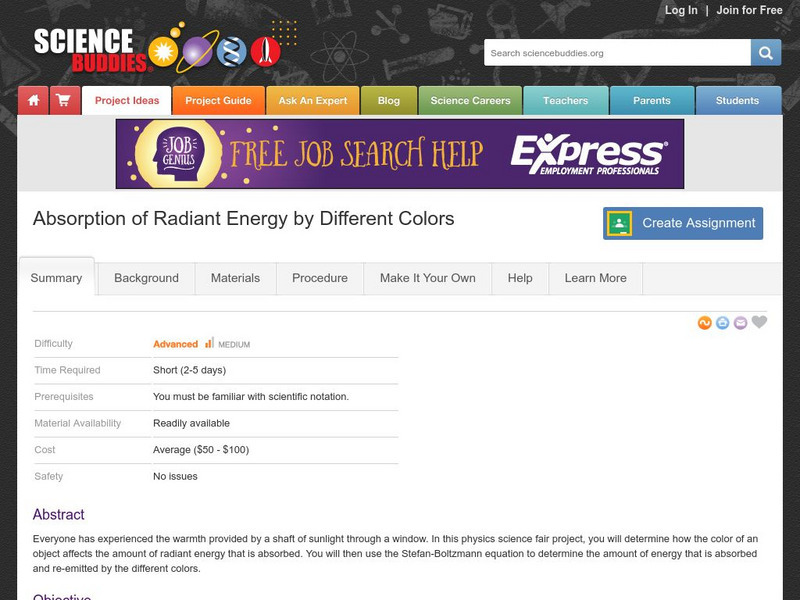Hi, what do you want to do?
Curated OER
What Color is Chlorophyll?
Learners observe the interactions of chlorophyll and light. They develop and form their own testable hypotheses. Students predict the color of chlorophyll in various types of plants.
Curated OER
Examining Spectra
Students examine the spectra with the use of light while constructing their own spectroscope. They make observations about the colors and visible wavelengths of light and then conduct classroom discussions. As an extension students read...
Curated OER
Isaac Newton
In this online interactive history quiz worksheet, students respond to 10 short answer and essay questions about the life and accomplishments of Isaac Newton.
Curated OER
Finding Verbs
In this grammar worksheet, students review and discuss all the different types of verbs there are to choose from and then find and circle the verbs in nineteen sentences.
Curated OER
Chandra X-Ray Observatory
Students tour Chandra's top galactic X-ray images. In this Chandra X-Ray Observatory instructional activity, students play games and complete puzzles based on the Chandra Mission and X-Ray Astronomy. Students listen to pod casts,...
Curated OER
Classification of Clouds
Learners view progressive slides of cloud formations and identify which type of cloud is shown as it forms. They estimate the cloud's height while viewing each image.
Curated OER
Enlightening Explorations, Part III
Sixth graders continue their examination of light. In groups, they make rainbows and examine the spectrum of visible light. They travel between various stations recording their observations about the behaviors of light. To end the...
Curated OER
Clouds as Art: Torn Paper Landscape
Students create a torn paper landscape and use it to study clouds. In this cloud study and art instructional activity, students make a background art image from torn paper. Students create a torn paper landscape and use cotton balls to...
Curated OER
All That Glitters...
Young scholars study that white light (visible light) is comprised of all colors of the spectrum. They study that the quantity of light decreases with increasing depth in the ocean. They study that the quality of light changes with...
Curated OER
Flame Test
Students conduct a flame test on different substances. In this chemistry lesson, students predict the element present based on the color emitted during the flame test. They explain how different elements produce different colors.
Curated OER
Rainbow Science
In this reading comprehension activity, students read five paragraphs about the science of rainbows. Students then answer several questions about the reading.
Curated OER
Solar Activity
In this solar activity worksheet, students complete a puzzle given a word bank with matching numbers. The numbers correlate to the answers to basic math problems that use the order of operations. Students use their mathematical answers...
Ducksters
Ducksters: Physics for Kids: Light Spectrum
Kids learn about the science of the light spectrum. Wavelengths and frequencies of the electromagnetic waves including visible light, primary colors, and subtractive colors.
Other
Tooter4kids: Light and Color
You'll find a wealth of resources at this site dedicated to color! Easy-to-read discussions can be found on topics ranging from the science of light to complementary colors and the color wheel. All special terms are highlighted and...
NASA
Nasa: Tour of the Electromagnetic Spectrum: Visible Light
Visible light waves are the only electromagnetic waves we can see. We see these waves as the colors of the rainbow. Each color has a different wavelength. Red has the longest wavelength and violet has the shortest wavelength. When all...
Science Struck
Science Struck: Wavelength of Visible Light Spectrum
Explains where visible light fits into the electromagnetic spectrum and the wavelengths for the different colors we see.
Sophia Learning
Sophia: Light Waves: Lesson 4
This lesson will introduce light waves and describe how a particle can travel as a photon or a wave. It is 4 of 4 in the series titled "Light Waves."
Science Buddies
Science Buddies: Absorption of Radiant Energy by Different Colors
In this science fair project, use an infrared thermometer to measure the temperature of differently colored paper exposed to sunlight, and calculate energy emission using the Stefan-Boltzmann equation. Find discussion questions, a list...
NumberNut
Number Nut: Light and Colors
Discover the relationship between light and colors in this brief lesson. Links to related color identification activities, Color Memory Challenge and Identifying Colors Quiz. Immediate feedback given to responses that includes...
Science Struck
Science Struck: Color Spectrum Chart With Frequencies and Wavelengths
Read about the visible light spectrum and learn the frequencies and wavelengths for each of the primary and secondary colors.
Annenberg Foundation
Annenberg Learner: The Science of Light: Light in Color
Site explores colors and how they are formed. Provides three different activities to explore color.
University of Colorado
University of Colorado: Physics 2000: Temperature and Absolute Zero
A thorough, multipage discussion of color and color television sets that explains how an image is formed on the television using red, green, and blue light. Understandable discussion, excellent graphics, and many interactive Java applets.
CK-12 Foundation
Ck 12: Chemistry Simulation: Neon Lights
[Free Registration/Login Required] Neon lights are a type of discharge tube. Observe how electrons create colored light in a hydrogen gas discharge tube. Can you figure out why hydrogen's emission spectrum contains more than one color of...
Physics Central
Physics Central: Physics in the Snow: Snowy Colors
A simple experiment through which students observe the connection between color and heat and prove that dark-colored objects and light-colored objects heat at different rates, even when exposed to the same heat or light source.























